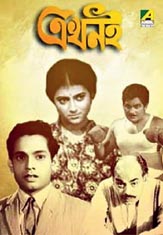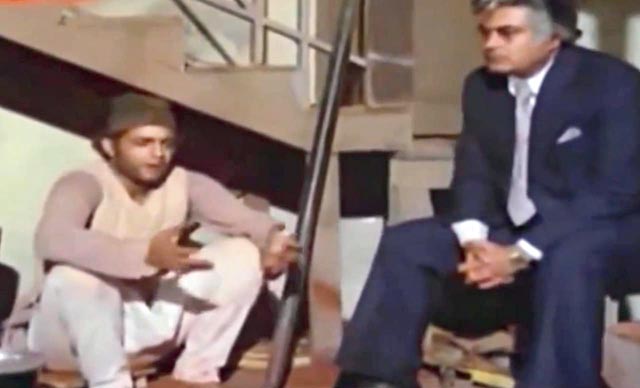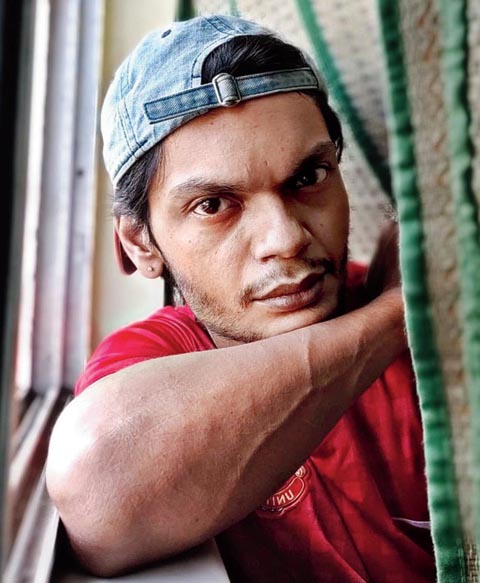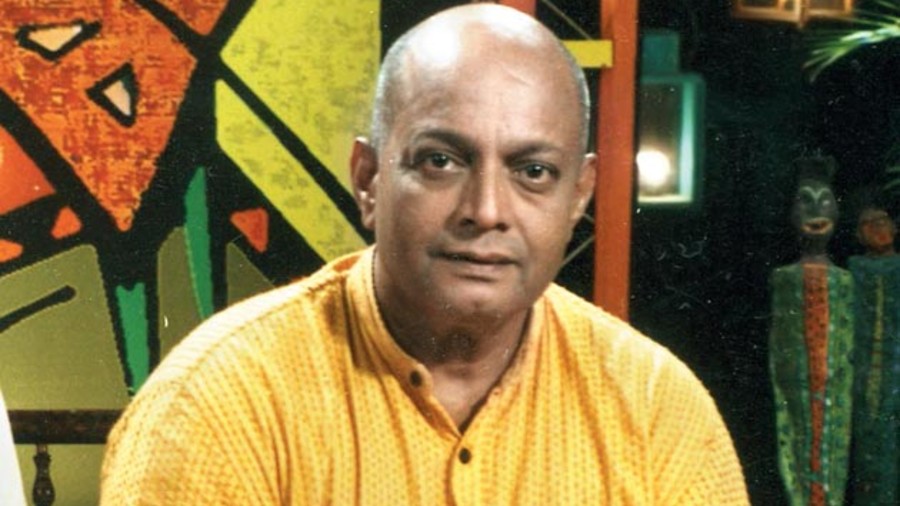I won’t be around forever, but my work will live on…”
My father would occasionally drop these profound pearls of wisdom on us. Seldom would they be as ill- timed as they were on this occasion. On the very day that his immunotherapy had begun, he was acting rather adamant about going for a shoot. We, his family, protested. His doctors advised against it, but dad had made his mind up. As frustrating as it felt to see him prioritise his work over his health — work that he gave his heart, his soul and the best years of his life to — those words stayed with me, even though it took me years since the day to fully grasp what he had meant.
On that fateful day, he would be shooting for Ebhabei Golpo Hok, a film directed by Rohan Sen. I believe that was another reason why my father was so particular about keeping his commitment —he always enjoyed working with youngsters who were passionate about their craft and eager to learn. It always filled him with joy and made him feel rejuvenated. Not surprisingly, the team was just as eager and enthusiastic about working with him.
The film that is now available on the OTT platform Klikk, is special to me for a lot of reasons. I have known Ananda for a while now and he is a remarkably kind-hearted person. His devotion to his craft and his humility are exemplary. Bibriti (Chatterjee) is an actress whose work I greatly admire. Rupanjana Mitra is someone I look up to, not just because of her prowess as an actress, but also because as a senior she has always been extremely supportive and encouraging. Shantilal Mukherjee, or Shantida as I call him fondly, was my co-actor on my first day in front of a camera. Since then, we have worked together quite a few times and not only is there so much I learn from him each time, he is also one of those jovial people who make light work of even the most strenuous schedules.
Of course, what makes the film truly special to me is that it might just be my father’s last release. I suppose, the feeling is rather bittersweet. On one hand, so many young and hardworking individuals are setting out to carve out a place of their own, on the other, it is the conclusion to my father’s five-decade-long, illustrious career. It’s a very emotional time for me, forthe entire family and for my father’s fans and admirers. It has made me want to revisit some of his previous works that have left an impression on me on a more personal level.
Chhuti
The 1967 film was with good reason a film that dad was immensely proud to be a part of. Directed by Arundhati Devi and based on Kharkuto by Bimal Kar, it found phenomenal success upon release and catapulted my father and Nandini Maliya to stardom. I would learn much later in life that the film and its lead pair had been bestowed with several prestigious honours, including the BFJA awards and the National Awards. The memories of watching the film with my father are still vivid, though back then I couldn’t comprehend just how extraordinary the film was and how its success would prove to be paramount in shaping my father’s life. To this day, elders, friends’ parents and seniors recount how they had fallen in love with my father after watching Chhuti, how it made dad the heartthrob of Bengali cinema. The film leaves one in tears, but the memories make me smile.

Ekhoni
Fifty years since its release, Ekhoni is still as relevant today as it was then. The story revolves around a set of friends, struggling after graduation to find their feet in the real world. The struggles to find a job, the despairs and taunting of elders, the taboo around pregnancies outside of marriage and friendships that pay no heed to differences in political beliefs or social statuses — Tapan Sinha’s film is testament to how little the human condition has changed in 50 years, even though so much around us has transformed.
Ekhoni was without doubt far ahead of its time. For instance, in an era where heroes and heroines reigned supreme, Ekhoni boasted of an ensemble cast of Aparna Sen, Moushumi Chatterjee, Gita Dey, Swaroop Dutta, Chinmoy Roy and, of course, my father. I personally treasure this film because my memories of my father are filled with instances of him singing the song Bondhu tomar ashar asha te from the film at social events, stage performances or even at soirees hosted by him.
Dad was extremely passionate about music and a trained singer. This film, more specifically this song that was sung by him and picturised on him, had won him a lot of love and adulation. For as long as I can remember, people would not let him wrap up an evening without at least one rendition. My father was always more than happy to oblige.
Mausam
During his time in Mumbai, my father had the opportunity and the privilege to be a part of Gulzar saab’s directorial team, an association that allowed him to work behind the scenes on some very popular Hindi films of the era. It was around this time that he had one of his dreams come true. My father was an absolute fanboy when it came to Sanjeev Kumar. He idolised him, watched each of his films several times and tried to study and learn from his performances. It is no surprise then that whenever he spoke about his experience of the film Mausam, he had a glint in his eyes and a childlike euphoria in his voice. It was a cameo that came to him while working on the film in a different capacity, but he would have the opportunity to share the screen with his idol. Needless to say, he seized it.

Mausam was not just a film, it was the realisation of a long-harboured dream. It was an experience that he never grew tired of narrating, the experience of performing alongside THE Sanjeev Kumar, of how after the scene was wrapped, Mr Kumar had commented that Gulzar saab had brought in a “Bangal ka sher”, being associated with a film that had a subject so far ahead of its time — all of it would shape his later years.
Janani
I was in middle school when my grandfather passed away. As is the custom, dad had shaved his head. A chance encounter with an old friend, Bishnu Pal Choudhury, led to an offer that took his career in a new direction. Bishnu uncle loved dad’s bald-headed look and wanted him to play the villain Phooka Baba in his daily soap, Janani. I don’t think even dad could have imagined at the time how immensely popular the character would become. It was hysteria. Random people would come up to him at restaurants and tell him, without mincing words, just how evil they thought Phooka Baba was. It’s funny now, but back then I remember being so offended because kids at school would pick on me by using the signature punchlines of my father’s on-screen persona! My father would laugh it off, of course, much to my displeasure.
Janani was the beginning of a new phase in my father’s career, this time as the big bad villain. As for me, I learnt to take it in my stride. I have to admit, there were also instances where I used being Phooka Baba’s son to get my way!
Byomkesh O Chiriyakhana
This film will forever remain special to me. Anjan Dutt is someone who gave me the very philosophies of acting that I now base my performances on. It was while working under him on his plays that I started discovering my own craft. But with Chiriyakhana, he did something that unfortunately will never happen again... it gave me the opportunity to perform alongside my father. I was a nervous wreck the entire time. But those few frames where my father and I are on screen together, will be treasured by me for as long as I live.
When I look back at how his work shaped me or when I try to gather the memories of my father as a performer, I think it’s more the memories associated with certain works than the works themselves that have left a lasting impression.
I like to believe my father knew better all along that it’s not the work we do that is our legacy, but the way that work impacts others, the lives it touches, the memories it forms. That is my father’s legacy, in the memories of him that have been etched into the hearts of his audiences.

Actor Debopriyo is the son of late Mrinal Mukherjee











